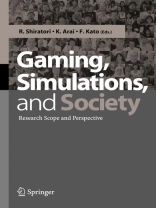The Japan Association of Simulation & Gaming (JASAG) and the Science Council of Japan (SCJ) hosted ISAGA 2003, the 34th annual conference of the International Simulation and Gaming Association (ISAGA), at Kazusa Akademia Park in Kisarazu, Japan, August 25–29, 2003. About 450 participants and guests attended, with 330 from Japan and 101 from 34 other countries. The number of submitted papers and reports exceeded 210, and in addition, many poster presentations and experiential sessions were held. This book is made up of 30 papers submitted to ISAGA 2003 and provides a good example of the diverse scope and standard of research achieved in simu- tion and gaming today.The theme of ISAGA 2003 was “Social Contributions and Responsibilities of Simulation and Gaming.” Looking back over the history of simulation and gaming research in Japan, in 1991 JASAG hosted ISAGA 1991 in Kyoto. However, even though there were only 12 years between ISAGA 1991 and ISAGA 2003, and both conferences were held in the same country, Japan, for Japanese researchers, the meaning of hosting these two international conferences of simulation and gaming research was very different.
Innehållsförteckning
Toward a New Science of Simulation and Gaming: ISAGA and the Identity Problem of Simulation and Gaming as an Academic Discipline.- Social Sciences and Simulation and Gaming.- The Game of “Forming a Coalition Government”.- Environmental Commons Game: Is the Free Rider a “Bad Apple”?.- Use of Gaming for Training Emergency Headquarters in Responding to Earthquake Damage: VEQRES/SAITAI—Virtual Earthquake RESponses—.- The Urban Network Game: A Simulation of the Future of Joint City Interests.- A Report of U-Mart Experiments by Human Agents.- Price Competition Between Middlemen: An Experimental Study.- Social Relevancies in Simulation and Gaming.- Facilitation in Communication: Toward a Study of an Educational Gaming Simulation.- The Features and Roles of Simulation Software in the Classroom.- Instructional Activities Game: A Tool for Teacher Training and Research into Teaching.- Prefrontal Cortex Deactivation During Video Game Play.- The Quantity and Context of Video Game Violence in Japan: Toward Creating an Ethical Standard.- Background and Current Status of Learning Games in the Field of Japanese School Education.- Yutori Is Considered Harmful: Agent-Based Analysis for Education Policy in Japan.- Strategies and Policy Exercise.- Simulations and Social Responsibility: Why Should We Bother?.- Motivation Styles to Speak Out, Decision Rules, and Group Size as Determinants of Group Decision Making: Simulation of Meetings.- Openness: A Key to Good Team Performance.- A Business Game with Social Consequences.- Designs and Tools of Simulation and Gaming.- An Evaluation of Role-Playing Gaming on Reformation Toward Sustainable Rural Society: How to Awaken a Regional Context in Citizens.- Congruent Facilitation of Simulations and Games.- The Loss of Concentration by the Effects of the Timing of Commercial Breaks.- Utilization of Neural Networks and Genetic Algorithms to Make Game Playing More Exciting.- Effective Learning Through Gaming Simulation Design.- For the Knowledge Society: How to Involve Human Resources in Gaming.- Paradigms in Simulation and Gaming.- Social Contributions and Responsibilities of Simulation and Gaming: Thoughts on the Retirement of Gaming Simulations.- Enhancing Policy Development Through Actor-Based Simulation.- Complex Project Management and Gaming Simulation Methodology: Enriching Interfaces Between the Mission and Performance.- Possibilities and Prospects of On-Line Games in Asia.- Information Technology Policy and Culture in France.- Agent-Based Simulation of Alliance of Automobile Enterprises.












